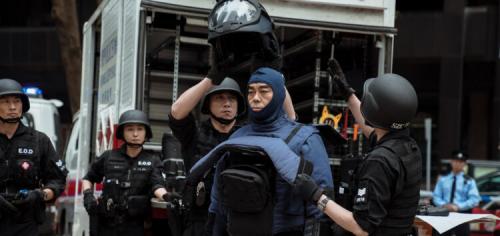Cast: Christopher Plummer, James Mason, and Donald Sutherland
Director: Bob Clark
124 minutes (12) 1979
Studio Canal Vintage Classics Blu-ray
[Released 28th June]
Rating: 8/10
Review by Christopher Geary
London after dark. A nightmarish stalker on fogbound streets. Women are slaughtered in Whitechapel. Gruesome death lurks in alleys where a gothic atmosphere often blocks out sunlight, even on some beautifully designed urban sets. Scenes on docks and wharfs are particularly effective. Murder By Decree remains the finest film about Sherlock Holmes, here tackling his greatest (non-Arthur Conan Doyle) crime story, the real-life scandals of the world’s prototype serial-killer, Jack the Ripper. This very welcome hi-def edition (that includes English subtitles) begins with an on-screen ‘trigger warning’, about its ‘historical attitudes’ that might cause offence.
Bob Clark’s admirably straightforward direction benefits
from the efforts of a superb cast, who are more than a match for the leads of Herbert
Ross’ stylishly eccentric The Seven-Per-Cent
Solution (1976), where an addicted Holmes met Freud. Although,
traditionally, Sherlock has been played by top British actors, it’s fascinating
to see how well Canadian star Christopher
Plummer (who died in February 2021), portrays the most celebrated of fictional
detectives. As Dr Watson, the usually formidable James Mason is also excellent,
with a supporting performance so confident, like he’s part of a timeless
double-act, that this pair illustrate a genuine friendship as few partnerships
from 221B Baker Street ever managed before, or since.
Prompted by local merchants to investigate the East End murders, Sherlock consults the psychic medium Lees (Donald Sutherland), a man with haunted eyes who claims to have visions of the Ripper. Scotland Yard’s own dogged policeman Lestrade is played by Frank Finlay, returning to the role he had in the movie A Study In Terror (1965), a previous version of this Ripper mythology. Case-book policeman Inspector Foxborough (David Hemmings), fronts a secret plot by radicals against the monarchy, while Sir Charles Warren (Anthony Quayle) adopts a stridently corrupt position as Holmes’ authoritarian nemesis, protecting a source of ghastly mutilations.
Holmes takes on a chimney-sweep disguise. Dr Watson gets himself arrested. Crushingly traumatised victim Annie Crook (scene-stealer Genevieve Bujold) is barely coherent, and committed to an asylum. Despite a balancing of spontaneity in its comedy-drama with creepy mystery-horrors, this Victoriana movie avoids the grisly slasher mentality, as explored in From Hell (2001), except for just a few scenes of bloody violence. Atypically, melancholy heroism emerges from gallantly re-active desperation, rather than any astute planning or keen-eyed judgements. Holmes is nominally polite in society but rather less coldly calculating. Plummer makes him far more compassionate, and too intelligently liberal for Tory snobs when he’s quietly dismissive of titled toffs. Obviously, Plummer is the people’s Sherlock.
From a wonderful bit of character-building about Watson eating a last pea, to an ultimate confrontation with a sinister conspiracy of a Freemasons order, this movie scales up from a wholly mundane modernity, to an esoteric and yet compelling answer to London’s most infamous unsolved crimes. “Imagine a more malign influence at work.” Clearly, this most human champion of all the Holmes on screen feels obliged to speak truth to power. For a negotiated showdown with the Prime Minister (John Gielgud), the soloing Holmes asserts, “I would prefer some more reliable authority”, when only token ‘justice’ appears possible.





































